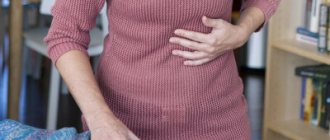Why do you feel sick after coffee?
If a person’s health systematically worsens after drinking coffee drinks, the reasons for such changes in condition must be immediately identified. Most often, one begins to feel nauseous due to the following:
- blood pressure surges;
- irritation of the gastrointestinal tract, development of gastritis;
- overdose of an invigorating alkaloid;
- preparing a drink from low-quality raw materials;
- The invigorating liquid is drunk before eating.
Increased pressure
Nausea from coffee is often observed due to a sharp change in blood pressure. It is worth noting that in small concentrations, caffeine helps to increase the elasticity of blood vessels and is not capable of leading to hypertension. Its negative effects are indicated by accompanying symptoms:
- it starts to get dark in the eyes;
- dizziness;
- weakness;
- increased heart rate.
If such signs are not observed, the reason for the jump in blood pressure lies not in the espresso you drank, but in something else. For example, similar problems are observed in people who lead an unhealthy lifestyle.
Stomach irritation
The gastrointestinal tract system is designed to break down food and liquid entering the body. At the same time, many foods can make the stomach mucous membranes overly sensitive. This condition can take a chronic form and lead to the development of ulcers and gastritis.
Coffee drinks provoke excessive secretion of gastric juice, getting on the already irritated walls of the organ. The result is nausea and belching after coffee.
Overdose
As a rule, after one cup of espresso no negative changes are observed. An overdose of coffee can provoke their appearance. It is strictly forbidden to drink it too often. This is due to the fact that the natural stimulant is removed from the body too slowly. The interval from one dose to another should be at least three hours.
The daily intake of caffeine varies between 250-300 milligrams. This is about 2-3 cups of aromatic espresso. An excess of the alkaloid leads to nausea after coffee, and even vomiting is possible. As the situation worsens, convulsive syndrome is noted.
Low quality
The reason that after drinking a drink you feel sick and start to feel sick is often the low quality of the raw materials. Often such problems are noted when using a soluble product. A lot of chemicals are added to it. In the process of preparing powder and granules, low-grade grains characterized by high acidity are used. Naturally, it is difficult for the stomach to cope with such a large load.
Use on an empty stomach
If you feel sick from coffee in the morning, this may be due to drinking an invigorating drink on an empty stomach. This habit can lead to disruptions in the functioning of the cardiovascular and nervous systems, as well as disrupt the functioning of the gastrointestinal tract. Drinking a drink before meals provokes bloating, stool problems, and nausea.
In addition, an alkaloid that enters the body in the morning leads to active synthesis of cortisol. This hormone is responsible for energy production. With its excessive concentration, the level of serotonin decreases. As a result, insomnia and depression are noted.
Caffeine
To know the causes of nausea from coffee drinks, it is important to understand what caffeine is. It stimulates the central nervous system.
Stimulants have a huge impact on the human body: they increase the production of adrenaline, speed up the heart rate and breathing, and increase blood pressure. Caffeine has serious effects. Stimulant effects may cause headache, anxiety, insomnia, dizziness, excitability, poor concentration and nausea.
How to prevent nausea
Systematic deterioration of the condition after drinking espresso is a reason to consult a doctor. It is necessary to conduct a gastroenterological study, check how often the heart muscles contract, and take tests to determine the level of hormones.
If such problems occur in women, a pregnancy test should also be performed.
The following recommendations will help prevent the occurrence of such symptoms:
- purchase quality products;
- drink coffee with milk. This way it is possible to reduce the acidity level;
- drink a maximum of a couple of cups a day at intervals of 3-4 hours;
- prepare a drink that is not too strong;
- do not drink invigorating liquid on an empty stomach;
- drink at least a small amount of water.
How to get rid of nausea at home?
The following ways can help alleviate the condition at home:
- Prepare strong tea from equal amounts of chamomile, mint, lingonberry or St. John's wort leaves. Drink in small sips, but if you can’t make tea because you feel very nauseous, you can simply chew a leaf of any of the listed plants.
- Aromatherapy. To carry out this procedure, you will need essential oils such as tangerine, lavender, and citrus. Add a few drops to the aroma lamp and enjoy the pleasant scent. The unpleasant feeling should go away after a few minutes.
- Tea with lemon and ginger. The beneficial properties of this drink are that it neutralizes hydrochloric acid in gastric juice, eliminating the symptom of nausea.
- Grind 100 grams of dried cranberries and 200 grams of lingonberries. Pour in 3 cups of boiled water. Leave to infuse for 2-3 hours, strain through several layers of gauze. Daily dosage: 50 ml up to 6 times a day.
Why do you feel dizzy?
Weakness and dizziness after coffee are most often observed due to exceeding the permissible dose. With an increased concentration of substances contained in coffee beans, the body's defenses are activated. In order to prevent overstrain of the heart and blood vessels, the sensitivity of the receptors responsible for transmitting impulses from the brain to various organs and systems is reduced. Due to this, the drink has the opposite effect, causing weakness, dizziness, and drowsiness.
Increased sensitivity of the body to substances included in the grains is also possible. In this case, a deterioration in the condition is noted after each use of espresso.
Overdose
If you drink too much coffee at once, you may overdose. The main symptoms are dizziness, diarrhea and nausea.
What to do in this case?
- Rinse the stomach. Drink a large amount of water and forcefully induce a gag reflex.
- Drink activated carbon.
- Then drink plenty of clean water.
If you drink too much coffee at once, you may overdose. The main symptoms are dizziness, diarrhea and nausea.
What to do if you feel sick after a cup of coffee
When you feel sick from coffee, dizziness, nausea are noted, you should do the following:
- lie on the bed, raising your head slightly;
- unbutton the top buttons on the collar of a blouse or shirt;
- open the window so that air can flow freely into the room;
- eliminate extraneous noise (turn off the TV, computer);
- drink cool water, but in small quantities.
If the actions taken do not give the desired result, the condition worsens, you should seek help from a medical facility.
Coffee can be both beneficial and harmful to the body. Its use should not be excessive. It is extremely important to comply with the permissible daily intake and not drink your favorite drink on an empty stomach. Thanks to this, the risk of nausea and other negative changes is minimal.
Causes of nausea from coffee
Have you encountered a situation where a cup of coffee makes you feel sick? There may be several reasons for this reaction of the body.
Stomach irritation
The gastrointestinal tract is constantly exposed to stress, because we take food and drinks at least three times a day, or even more often. Not everything that goes into the stomach is healthy. The development of stomach sensitivity to irritants occurs gradually, but with chronic disruption of the integrity of the gastrointestinal mucosa, you may encounter unpleasant diseases - gastritis or ulcers. Drinking coffee on an empty stomach can cause discomfort if the mucous membrane is already hypersensitive. In this case, the secreted gastric juice, not finding a target for use, begins to irritate the walls of the stomach, causing nausea.
Hypertension
It has become popular to explain nausea from coffee as a sharp increase in blood pressure, but arterial or intracranial hypertension is accompanied by a whole set of symptoms, including, in addition to nausea, dizziness, weakness, blurred vision, and rapid heartbeat. If in addition to nausea there is at least one of the additional symptoms, then it is quite possible that the pressure has indeed increased. Symptoms of hypertension are especially active in the morning. It is not coffee that causes an increase in blood pressure, but a set of factors - poor lifestyle, excess weight, stress, nicotine and alcohol abuse, poor sleep.
Low quality of the drink or additives to it
For some reason, the abundance of sweet toppings that food establishments add to drinks does not confuse their visitors. Meanwhile, the calorie content of a serving of a coffee cocktail can be equal to a third of the daily requirement. The stomach cannot always cope with such a load, hence the reaction. Poor quality grains or instant powder can also cause nausea.
Changing Individual Reactions
Most often this is due to chemical processes in the body - hormonal surges or declines change the general background, therefore the body’s reaction to coffee can change throughout life. As a rule, such changes are typical for women: pregnancy, menstrual cycles and other hormonal changes may well cause nausea from coffee.
Excess caffeine
Excessive coffee consumption can lead to caffeine overdose. This is possible if you drink several servings of coffee at short intervals. Three to four hours should pass between coffee intakes, during which time caffeine ceases to have an effect and is eliminated from the body. If it is taken continuously, an overdose can cause nausea and other unpleasant symptoms.
✅ Why coffee makes you sick in the morning – ipraktica.ru
Attacks of nausea after coffee should not be ignored. There may be several reasons why you feel sick after drinking this drink. Which we will now examine in detail.
Drinking coffee on an empty stomach
Can you feel sick from drinking coffee on an empty stomach?
For many, a cup of coffee replaces breakfast in the morning. The drink invigorates, helps you wake up and concentrate. And at this time a violent reaction occurs in the stomach.
Caffeine has a stimulating effect on the digestive system. Gastric juice begins to actively secrete, which has nothing to digest in an empty stomach.
Such an aggressive acidic environment causes vomiting. But if attacks of nausea are felt not only in the morning, then their cause is different.
Stomach diseases
A sick stomach reacts to coffee with bouts of nausea
Once coffee enters the esophagus, it acts as a strong irritant to the entire digestive system. The hydrochloric acid produced when the mucous membrane is damaged and sensitive will cause a person not only painful sensations, but also nausea.
For those who suffer from gastritis or ulcers, it is better to exclude or limit the use of this drink.
In addition, this drink is one of the strongest foods that provoke an increase in acidity, which can affect the liver. Excessive acid production prevents the breakdown of proteins, which begin to “ferment” in the stomach and cause a lot of unpleasant sensations, including attacks of nausea.
Increased pressure
Increased blood pressure from caffeine may be accompanied by nausea
Caffeine slightly increases blood pressure. It has been proven that this effect of the substance is more likely to occur with rare or one-time consumption of coffee. Those who regularly drink this drink in acceptable quantities do not observe such symptoms.
But coffee lovers run the risk of becoming addicted to coffee, in which they involuntarily begin to increase the amount of drink they drink per day or increase its strength. Under such conditions there is a risk of pressure surges. The blood vessels narrow, blood circulation is impaired, a feeling of nausea and even vomiting occurs.
Exceeding the permissible coffee limit
If an attack of nausea occurs after uncontrolled consumption of coffee during the day, then the cause may be an overdose of caffeine.
- Is it possible to drink coffee if you have gastritis? Coffee for gastritis with high acidity
It is not recommended to drink more than 2-3 cups of drink per day. You also need to keep in mind that the rate of elimination of the alkaloid from the body is on average 3 hours.
This interval must be maintained before each new cup.
When drinking coffee, you need to remember that high concentrations of caffeine are also found in green and black tea, dark chocolate, Coca-Cola, and energy drinks. If these rules are neglected, symptoms of caffeine intoxication may occur, including nausea.
Low grade coffee
A low-quality product can also make you sick. Feeling nauseous after drinking a drink of dubious quality is not uncommon. Especially if such coffee is purchased in mass service establishments, where it is difficult to determine its freshness and origin.
The soluble product is also not of high quality. It is counterfeited more often than other varieties, cheap raw materials are used in its production, and extraneous chemical additives are added.
Once in the stomach, such coffee can provoke an upset, which is usually accompanied by nausea.
Flavorings, milk and toppings
Additives in coffee can cause nausea To vary the taste, milk, various spices, sweet syrups, heavy cream, chocolate, and marshmallows are added to coffee. Such experiments can have a negative impact on your well-being.
https://www.youtube.com/watch?v=v5Avzg4a9ac
It is possible that there is an individual intolerance to any component that a person is not even aware of.
In addition, sweet additives increase the fat and calorie content of the drink, complicating the work of the stomach. In this case, the cause of nausea may not be the coffee itself, but its fillers.
Allergic reaction
An allergic reaction to caffeine can manifest itself in the form of nausea. Coffee beans contain chlorogenic acid, which is an allergen and, if consumed in excess, can cause unpleasant symptoms such as sneezing and throat irritation. From the digestive tract, they are expressed by nausea and stomach pain. Such an allergy reaction can occur even when inhaling the coffee aroma.
Source: https://coffee-sova.ru/zdorove-i-kofe/toshnit-ot.html











